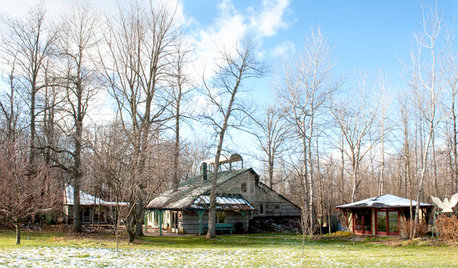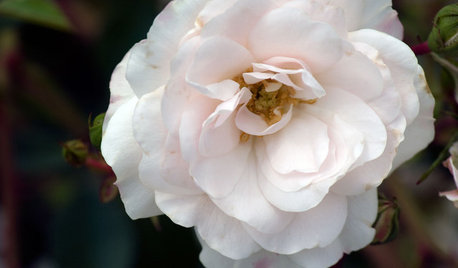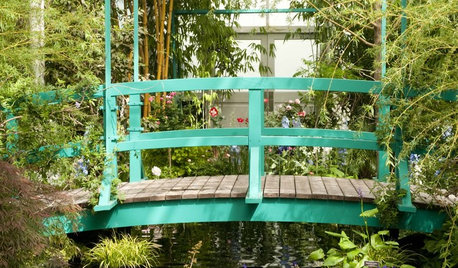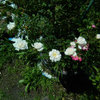Sudden rose death
I've had two roses just up and die this season for no reason I can discern. The first was Mel's Heritage. It was doing very well all spring, growing and blooming after sulking for two years. Then the canes started to darken. Now the plant is completely dead.
I left for the rose conference in England, and came back to find Clementina Carbonieri dry and brown. I have no idea what happened. I would suspect the gophers but it is in a gopher basket and anyway, it is still firmly rooted. The wood of the canes is completely dry and breaks easily. Either this was very fast -- I was only gone three weeks -- or it had started earlier and I did not notice it. That could be the case.
I am hoping it is not one of those devastating soil diseases that will render this part of the garden unusable. In any case, I don't plan to replace either rose until I know more.
Rosefolly
Comments (32)
buford
9 years agoI've had the cane darkening death. I guess it's canker. I bought 5 roses at a nursery sale for $10 each. Two of them up and died from it. One was supposed to be Chrysler Imperial, but wasn't, the one bloom was mauve. The other was Europeana. That died right away.
And I'm still cutting back my own roses with canker.
Related Professionals
Glendora Landscape Architects & Landscape Designers · Apollo Beach Landscape Contractors · Clayton Landscape Contractors · Lehigh Acres Landscape Contractors · River Ridge Landscape Contractors · Seven Hills Landscape Contractors · Southbury Landscape Contractors · Waldorf Landscape Contractors · Weymouth Landscape Contractors · Antioch Landscape Contractors · Glenn Heights Swimming Pool Builders · Long Branch Swimming Pool Builders · Newman Swimming Pool Builders · Conyers Siding & Exteriors · Westminster Siding & ExteriorsKippy
9 years agoDo you think the gophers could have tunneled all around the cage and the water ran off or down tunnels? We have one orange tree that we always were rescue watering because of gopher tunnels under the tree. I think I finally dug through all the old tunnels and after we soaked it good last year it seems to be happy again.
Now we seem to have a mole that found that area. Ugh
sammy zone 7 Tulsa
9 years agoThat is really weird. After moles or gophers, my first thought is ants, but you would see ants.
When you find out what happened, I hope you will let us know.
Sammy
jacqueline9CA
9 years agoDid you notice if the dead part started at the tips and worked its way down? I lost 2 roses a couple of years ago - one was a large Le Vesuve. Both were healthy and leafed out and blooming. Then the leaves on the tips of most of the canes died, the canes turned brown, and it proceeded down the canes (which I thought was really weird). It only took about 3 weeks for LV to be completely dead. The other dead rose was a one year old Lady Hilingdon. After much research and help from folks on here, I decided it was a really bad case of downey mildew. Some of my other roses had traces of it too, but I cut off the affected parts, and sprayed them with something that killed downey mildew, and they recovered. We had had a particularly wet Spring that year.
Jackie
rosefolly
Original Author9 years agoJackie, this is at a distant corner of my garden. I walk out there every few days but I don't see it daily. Possibly Mel's Heritage went that way but I'm not sure. I saw some dieback on Lady Hillingdon shrub, too, but I cut the dead parts off and it seems fine now. As for Clementina Carbonieri, that seems to have happened while I was away for the conference at Mottisfont.
I suppose downy mildew is a possibility, though I didn't see the foliage get really ugly which symptom I associate (perhaps inaccurately) with downy mildew. So is Kippy's idea, and so is Buford's suggestion of canker. I don't see any ants there. We switched to drip irrigation in that part of the garden this year to save water, so tunnels would be more a problem than they were in the past. I could pull back the mulch and chop up the soil in that area to fill potential tunnels. It won't help CC, though. That rose, like MH, is completely gone.
If I see it happening on other roses, I'll check for tunnels, cut off dead parts, and do a spray. Drat. I mostly do not spray except for copper at pruning time.
All of these possibilities are immensely better than oak root fungus, which is what I really fear. There are oak trees all over the place on our property so it could be present in the soil, and watering will wake up a dormant fungus. If that is the case, I will not be able to grow roses in that area at all.
Rosefollyroseseek
9 years agoOak Root Fungus would cause a decline in a plant rather than suddenly killing it. Sudden water stress is most likely the culprit and that usually results from gophers eating massive areas of roots or water being stopped. I would check the irrigation to those plants to make sure it isn't plugged, then check for tunnels. Those bloody things can easily get inside baskets. I've seen them crawl up into a five gallon nursery can to eat campanulas. If they want in, they will find a way. Severe mole activity could loosen the soil enough that lower water (such as drip) combined with a heat spike could cook the plant severely and appear "sudden". Good luck. I feel for you! Kim
floridarosez9 Morgan
9 years agoHave Chilli Thrips made it up there yet? They will outright kill a rose, and the canes die from the tip down and leaves turn brown and crispy. They are mainly a warm weather pest, but they can devastate a plant. Some roses seem to be more susceptible than others.
rosefolly
Original Author9 years agoChilli thrips are not here yet. No doubt we have that joy awaiting us in time.
rosefolly
Original Author9 years agoI went out and checked. No sign of tunnels that I could detect but the soil did seem quite a bit drier than I would like. We recently installed drip in that part of the garden so I suspect I am not watering long enough. I'll increase it. I understand spray reasonably well but I'm a novice at drip irrigation. Drip is supposed to use less water but I guess not that much less water.
Other roses in that bed seem okay, so maybe these are roses that are more sensitive to water shortage.
roseseek
9 years agoI realize the importance of metering out water efficiently, but my experience with drip irrigation for roses in an arid, hot climate is not good. Bubblers with good mulch are much better as far as health, longevity and performance of the plants are concerned. Perhaps for other climates, soil types and plant families drip works well. Increased heat, decreased humidity and intense sun, particularly if there is reflected/radiated heat from surrounding hard scape, all help to make drip insufficient for roses. YMMV. Kim
nippstress - zone 5 Nebraska
9 years agoGiven what you said about the soil being drier than expected, what you describe from your roses sounds a lot like what happened to my well-established Bella Renaissance a few years ago in drought season. I'd been watering all my beds with mostly overhead watering, but Bella must have been at the tail end of the sprinkler, as well as overly sensitive to water shortage as you mention Lyn. All of a sudden in late July/early August, it just started browning and dropping leaves like it was fall and no amounts of supplemental water at that point could save it. The decline was very fast as you describe - no more than 3 weeks from beautiful apparent health to totally dead.
Sympathies on the roses, but I'd look at the routine water conditions and try some of the alternatives Kim mentions (not that any of us need any further incentive to take his advice!). It's odd how just slight factors about the beds, locations, or roses can make such a difference in their responses to the water conditions.
Cynthia
rosefolly
Original Author9 years agoUnfortunately we had only six and a half inches of rain last year, and around 8 inches the year before. So far in my community water restrictions are based on reducing the amount we used last year, but if the drought continues, hoses and spray will probably be forbidden. Drip, though, may continue to be permitted. I still have spray irrigation on the front garden but the areas in the back are all drip. I probably need to add more drip lines and run them longer. It is certainly not ideal, but I think it is better than nothing at all.
If I lose all my roses I'll move to a climate with higher rainfall. Really. I like native plants, and indeed have put in quite a few. They can make quite beautiful and interesting gardens when carefully chosen and placed, but I'm not giving up my roses if I have any choice in the matter.
(Stated with an air of grim determination.)
Rosefolly
roseblush1
9 years agoRosefolly ..
I don't know what type of emitters you are using for your drip system, so you may very well be ahead of me when I suggest that you use the kind of emitters used for "trees" instead of "shrubs". I had only used drip irrigation one year, but decided that it was not effective in my soil .... lots and lots of small rocks and clay. My soil drains well, but due to the clay it also holds moisture well.
I had the sense when I used the suggested emitters that even leaving the system on longer than recommended, did not allow the whole root system to get sufficient moisture.
I live in an area where in a dry year we get 25" of rain and in a wet year can get up to 50". Last year we got about 15" ... most of that within two months.
I think this drought has a greater impact than most of us understand. Generally, in my climate the soil gets saturated by months of rain, then we have the dry summer months. For the last three years, we haven't gotten that complete, deep soil saturation. For the first time I am having to water the junipers up on my slope and I think I am going to lose a couple of trees up there.
People speak of the water table and such, but I think it is more complicated than that. Of course, these thoughts come from just observing what I am seeing around me.
Smiles,
Lynannesfbay
9 years agoI'm sorry to hear about your roses. And, I agree, a garden without roses is no garden for me either.
I added a couple of more emitters (I started with one which was ridiculously inadequate) around my roses which helped. The soaker hoses encircling the roses and under the mulch even though very small at 1/4 inch diameter (I think) are even better. I'm going to try the emitters called "shrubblers" and see how they do. Good luck!
Anne
nikthegreek
9 years agoChanging from spray irrigation to drip can be tricky for established plants since this requires adaptation of the root system. I suggest the change is made during the wet season (if any) and be gradual. Going from spray to soaker hose to drip might be a good method for allowing the plants to gradually adapt.
NikKippy
9 years agoI am sure you are right Nik but some areas are under restrictions so waiting til the rainy season is out. And it could be that the spray water encouraged roots higher up and the drip could not match that need. Also when it is under layers of mulch and compost it is harder to see how the soil looks.
Mom and I have this conversation all the time....she wanted to water again today. The roses look fine so she needs to wait. Hard for her not to water daily and trust that the are fine
rosefolly
Original Author9 years agoI gave the roses of the Olive Tree bed where these two roses died an extra watering yesterday. I hope it helps.
I lost a few of the young natives I have planted outside the fence while I was away at Mottisfont. They were young ceanothus, ribes, and salvias that had not yet grown enough root to make it for that long without my assistance. I have been hand watering them to get them established, at my estimate two years for most plants, a bit longer for the marginally drought adapted (like the thuja I just had to have). I knew that some might die so it did not come as a surprise like the death of the rose did. I will be replacing some of them, but will wait for the fall rains to do that.
One of the things I have done for the native area (I call it my Bird Garden) it try to choose plants that are adapted to my area and also ones adapted to areas a little bit drier. That way they should be able to survive a drought of several years if need be. For example, I planted three valley oaks (Quercus lobata), which is marginally native here. We already have about a dozen coast live oaks (Quercus agrifolia) growing on the property. But I also planted three blue oaks (Quercus douglasii), which is adapted to areas with half our rainfall, just in case things get really bad. I have done the same with conifers, planting three incense cedars which should do okay with near normal rainfall, but also an Arizona cypress and a couple of Afghan pines, adapted to much drier regions than mine.
All of these I water for now by trudging up and down the hill with buckets and a long, long hose. I did not install any irrigation because with our water shortage, who can justify watering nearly three acres? In the long run, everything outside the fence will have to get along by itself. (Though I do plant in gopher baskets to give them a fighting chance).
Folly
rosefolly
Original Author9 years agoA follow up: I gave all my smaller roses on drip irrigation a good watering by a combination of hose and bucket, then increased both the duration and frequency the drip runs. My fingers are crossed that this is enough. All this took several hours to do. If not, I will extend the inline drip hoses to cover the ground more thoroughly.
I had not planned to spend much time in the garden today since I've done so much work on it every day since I got home, but it had to be done. Maybe I'll rest tomorrow. My back could use the break!
Rosefolly
Kippy
9 years agoI would love to see photos of your tree collection. Bet all the plants are happy.
I was reading a post from Las Pilitas the other day and they mentioned that they always get calls this time of year complaining that their ribes have died. They said to leave them because that is what they do when it gets hot and they will return next season.
Kippy
9 years agoI wish you all were closer as I have rolls of the 1/2" rubber weeper hoses that we are not using
annesfbay
9 years agoGood for you, Folly! Yes, it had to be done and you did it! You definitely deserve to put your feet up tomorrow. Setting up drip and then the inevitable reworking of lines and emitters and weepers is a chore to be sure. But, I hope, one that pays off.
Anne
rosefolly
Original Author9 years agoKim, Cynthia, Nik, Kippy, Lyn, and Anne, thanks for all the comments on watering and irrigation woes. I feel well supported! It is good to know that others have gone through the same thing and come through successfully -- or did not, and have good advice to offer.
Sammy, Buford, Jackie, and FloridaRose, if you are reading this, now you know it is a drought issue combined with gardener error. I'd rather have it be that, because there is something I can do, at least about the gardener error part. And Jackie, I checked the rose you gave me. It was in a different area but it, too, seemed to need more water. I have fixed that.
Jeri, I had temporarily gotten rid of the gophers inside the fence and was dealing instead with ground squirrels. I see that at least one gopher is now back, but not near the affected roses. Now I have ground squirrels and gophers. Sigh. We need a new dog. Well, we are planning to get one this fall.
I will leave the ribes in place until fall brings rain. I hope it brings rain! However, I did have a ribes die on me last year in an earlier round of native shrub planting. The replacement did fine, but the two more I added do not look good at all.
The Las Pilitas website is a favorite of mine, too. I have bought a number of plants from there, and my DH and I stopped at the nursery once and met Bert Wilson. We were sad to hear about his sudden death this past spring.
Last night my knitting/quilting group came over and I enjoyed sitting down and relaxing with a completely different activity. It was very restorative. I may knit some more today. I may even read! I think the garden can get by with only brief attention from me today, perhaps an hour or two of deadheading.
Rosefolly
This post was edited by rosefolly on Wed, Jul 9, 14 at 11:33
organic_tosca
9 years agofor Rosefolly:
Knitting is one of the great therapeutic activities (except, of course, when we get into a muddle). Good luck with your garden!
Laura (Sacramento Rose Garden)rosefolly
Original Author9 years agoLaura, agreed! Unfortunately I got myself into just such a muddle and now must wait until next week when a more experienced knitter will show me the error of my ways. I do enjoy it though. On our recent trip to Mottisfont Abbey I visited knitting shops in Dublin and Edinburgh, so I have some very interesting yarn to look forward to knitting as my skill develops. You cannot buy plants to take home when traveling overseas, but you can certainly buy wool. And I did!
Today I am all caught up on my watering, thanks to the help of my DH Tom. I pulled some weeds (one can always find weeds to pull), and now am off to do various indoor chores. It is less exciting than outside work, but we can only let the practicalities of life slide so long. Alas.
Folly
zeffyrose
9 years agoSo sorry for the loss of your roses----we lost two old established roses this year---no sign of RRD-----
New Dawn and Knockout---they turned brown and died---
Always makes me sad to lose a rose-----
Here in the Northeast we have had a lot of rain so it can't be lack of water
Florencerosefolly
Original Author9 years agoZeffy, you are wise to remind me that there are rose problems everywhere. We may have drought, but so far we do not have either RRD or Japanese beetles. I count us fortunate in that.
Folly
rosefolly
Original Author9 years agoJust a quick update: I decided to replace these two roses with different varieties. Instead of Clementina and Mel, I ordered General Schablikine and Mutabilis from ARE, both of which I had been considering for some time. I particularly admire a friend's Mutabilis in England, of all places. I also know it does very well in the Master Gardener demonstration garden in Palo Alto, so it ought to do well for me here. As for the general, I have been admiring photos and descriptions of its disease resistance as well as its floriferousness. Both roses are set to be delivered this fall once the weather cools and shipping can resume.
Perhaps I will try Mel again if another spot opens up on the fence, as indeed may happen. But maybe not -- this rose has disappointed me for three years now, only to suddenly start growing and shortly after that die. As for Clementina, I'll think about it. Not now.
I am in a replacement mode, but not increasing the number of rose plants.
Rosefolly
patricianat
9 years agoPaula, I am not sure if you have decided on the culprit, but I found in very dry weather, we had loss of roses farthest from our water source. It was obvious the cause when I found snakes in that area which were, most likely, "foraging" for the culprit voles that destroyed my roses which suddenly turned brown, falling dead after having been healthy weeks before.
rosefolly
Original Author9 years agoHi Patricia, my roses are all planted in gopher baskets, which for the most part prevents rodents from getting to the central core of the plant's root system. Of course they can eat the roots which grow out of the basket, and no doubt they do. Just to be sure, I tugged on the two roses which died. Both were still securely attached to a root system in the ground, which is not the case when gophers kill roses. I would guess that voles are similar in their attacks. If we have voles in our garden (and who knows? we might) I am not aware of them.
We do however have gophers and ground squirrels and snakes, both rattlesnakes and gopher snakes (AKA bull snakes). If the roses were not growing in protective baskets, rodent attack would have been my first suspicion.
In the end I decided I simply was not watering adequately, trying to conserve water beyond the tolerance of those particular roses. I have since doubled the amount of water, and so far, have had no more losses. My fingers are crossed that this is enough. I do not consider drip irrigation ideal for roses, but that is the reality of dealing with the drought.
I am still using spray irrigation in the front garden, very carefully calibrated so that none is wasted, and spraying in the early hours before dawn so that very little of it is lost to evaporation. We'll switch that when we are told we must. If we don't get a lot of rain this winter, I expect that to happen next year.
Rosefolly
patricianat
9 years agoOh, I should have read adequately. I was just "skimming" through. My apologies. I wish you all the best. I have been reading about the dire drought. We have been through that for a few years but this year we had very adequate rain for 3 months and then it stopped. Sprinkles here on and off but not enough to come in from the rain. Then I see all the flooding and wonder .... where is the mean?




















roseblush1